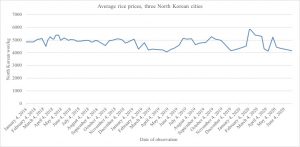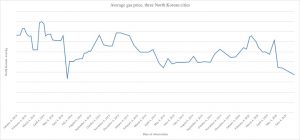By: Benjamin Katzeff Silberstein
So, it finally happened: North Korea has officially admitted the suspected existence of a Covid-19 case in the country. State media claims the virus was brought over by a so-called re-defector, who first left for South Korea a few years ago only to return now, reportedly by swimming across the Imjin river. Some South Korean media speculation seems to confirm that a re-defection did happen, reportedly by someone swimming across the Imjin river, though none of this is confirmed. Here is the North Korean statement in full:
Pyongyang, July 26 (KCNA) — Amid the intensified anti-epidemic campaign for thoroughly checking the inroads of the world’s threatening pandemic, an emergency event happened in Kaesong City where a runaway who went to the south three years ago, a person who is suspected to have been infected with the vicious virus returned on July 19 after illegally crossing the demarcation line.
The anti-epidemic organization said that as an uncertain result was made from several medical check-ups of the secretion of that person’s upper respiratory organ and blood, the person was put under strict quarantine as a primary step and all the persons in Kaesong City who contacted that person and those who have been to the city in the last five days are being thoroughly investigated, given medical examination and put under quarantine.
The Political Bureau of the Central Committee of the Workers’ Party of Korea convened an emergency enlarged meeting in the office building of the Central Committee of the WPK on July 25 as regards the dangerous situation in Kaesong City that may lead to a deadly and destructive disaster.
Kim Jong Un, chairman of the WPK, chairman of the State Affairs Commission of the Democratic People’s Republic of Korea and supreme commander of the armed forces of the DPRK, was present at the meeting.
Attending the meeting also were members and alternate members of the Political Bureau of the C.C., WPK.
Present there as observers were members of the Central Emergency Anti-epidemic Headquarters.
Party and administrative leading officials of the Cabinet, ministries and national institutions, members of the executive committees of provincial Party committees and senior officials of the leading institutions at provincial level were present in the video conferencing rooms as observers.
Upon authorization of the Political Bureau of the C.C., WPK, Supreme Leader Kim Jong Un presided over the meeting.
Despite the intense preventive anti-epidemic measures taken in all fields throughout the country and tight closure of all the channels for the last six months, there happened a critical situation in which the vicious virus could be said to have entered the country, the Supreme Leader said, adding that he took the preemptive measure of totally blocking Kaesong City and isolating each district and region from the other within July 24 afternoon just after receiving the report on it.
To tackle the present situation, he declared a state of emergency in the relevant area and clarified the determination of the Party Central Committee to shift from the state emergency anti-epidemic system to the maximum emergency system and issue a top-class alert.
He specified tasks for each sector to be immediately implemented by Party and working people’s organizations, power organs, public security and state security institutions, anti-epidemic and public health institutions.
The meeting unanimously adopted a decision of the Political Bureau of the Central Committee of the WPK on shifting from the state emergency anti-epidemic system to the maximum emergency system.
He instructed all the participants to immediately conduct follow-up organizational work to carry out the decision of the Political Bureau of the Party Central Committee in their fields and units, and party organizations at all levels and every field to ensure and guarantee the most correct implementation of the directions and assignments of the Party Central Committee with a sense of boundless responsibility, loyalty and devotion.
He underscored the need to thoroughly maintain tough organizational discipline and ensure the unity in action and thinking throughout the Party and society, to keep order by which everyone absolutely obeys and moves as one under the baton of the Emergency Anti-epidemic Headquarters and the need for party organizations at all levels to perfectly perform their role and duty.
Saying that everyone needs to face up to the reality of emergency, he appealed to all to overcome the present epidemic crisis by not losing the focus of thinking and action, practicing responsibility and devotion to be faithful and true to the leadership of the Party Central Committee, being rallied closer behind it so as to defend the welfare of the people and security of the country without fail.
The meeting sternly took up the issue of the loose guard performance in the frontline area in the relevant area where the runaway to the south occurred, and decided that the Central Military Commission of the WPK would get a report on the results of an intensive investigation of the military unit responsible for the runway case, administer a severe punishment and take necessary measures. -0-
(Source: “Supreme Leader Kim Jong Un Convenes Emergency Enlarged Meeting of Political Bureau of WPK Central Committee,” Korean Central News Agency, July 26th, 2020.)
This is of course makes for extremely convenient optics for the North Korean regime, and raises lots of questions.
First, to state the obvious: this would make for an extremely convenient way for the regime to admit the existence of Covid-19 in the country. I have written previously about how unlikely the regime claim of zero cases is. The message is: our anti-epidemic measures, such as closing the northern border, were flawless. But one case still slipped through the cracks. Having a first confirmed case coming in from the south relieves the regime of any awkwardness vis-a-vis China.
Second: this is all still very strange. How can the political and strategic cost be smaller of admitting a glitch in the southern frontline defenses? Look at the text in the statement: “loose guard performance in the frontline area” is not a small thing to admit. It’s far from unprecedented criticism, but still. What does it say about morale and readiness within the army that even at a time of relatively high tensions, “loose guard performance” can happen?
Third and relatedly: this is a lot of fuss for a suspected case. Kim Jong Un not only called an emergency politburo meeting, a major event in its own right. The state has also placed all of Kaesong under lockdown and required anyone that traveled to the city within the past five days to go into quarantine. Just imagine how many people in North Korea must be going around with symptoms that should cause suspicion of Covid-19. The sniffles and a subpar sense of smell and taste should be enough. And yet, this is the first time we’ve seen this sort of alarm.
Fourth: how was this detected, and why was this person specifically taken in for testing? Judging from the statement, he was able to slip back into North Korea undiscovered, only to proceed to move around freely in Kaesong and potentially spread the virus. Was he brought in for testing because he came in from South Korea, or because of specific symptoms? What happens to the undoubtedly more numerous arrivals from China – are they all placed under stringent quarantine? Kaesong is far less connected to the outside world than are other parts of North Korea. The chances of it spreading there but not in the north are…extremely, incredibly slim, at best.
In short, it’s very difficult to buy this as a credible explanation or excuse for a Covid-19 outbreak in North Korea. The virus has most likely been around for some time, perhaps something has now prompted the authorities to need to make an official admission. As always, all we can do is await more information and hope that some questions are answered.


